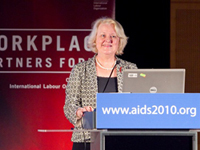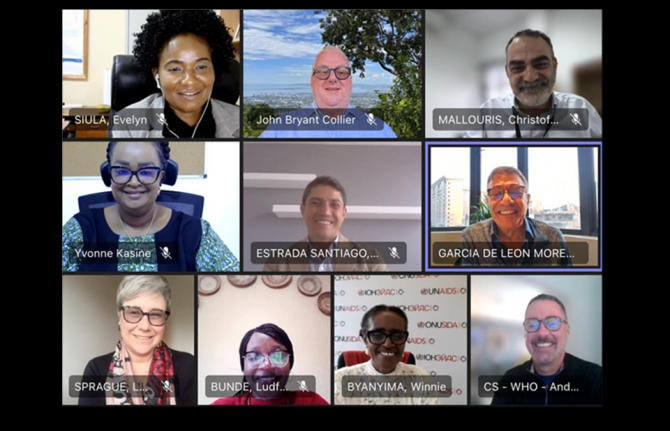
Feature Story
ILO workplace partners' forum tackles HIV with high level support
17 July 2010
17 July 2010 17 July 2010 UNAIDS Deputy Executive Director, Management and External Relations Ms Jan Beagle. Credit: UNAIDS Anna Rauchenberger
UNAIDS Deputy Executive Director, Management and External Relations Ms Jan Beagle. Credit: UNAIDS Anna RauchenbergerThe recent adoption of a ground-breaking human rights instrument on HIV and the world of work has brought the key role of the workplace in the global AIDS response into sharp focus.
On 17 July, the eve of the XVIII International AIDS Conference, the International Labour Organization (ILO) convened a workplace partners’ forum to explore how best to achieve greater coordination and harmonization in taking a rights-based approach to address HIV in the world of work.
Attracting high-level participation, the forum brought together delegates from UNAIDS and its ten cosponsors, HIV workplace implementers, workers, employers, donors and networks of people living with HIV. Speakers included the Honourable Rudolf Hundstorfer, Austrian Federal Minister of Labour, Social Affairs and Consumer Protection; Mr Patrick Obath, Chairperson of the Federation of Kenya Employers; and Ms Jan Eastman, Chairperson of the Global Union AIDS Programme.
UNAIDS Deputy Executive Director, Management and External Relations Brand, Ms Jan Beagle also gave a keynote address along with Dr Sophia Kisting, Director of the ILO Programme on HIV/AIDS and the world of work.
Ms Beagle highlighted the important role of the workplace in providing universal access to prevention, care and support saying “the workplace provides unique entry points to reaching people where they spend the most amount of time in their daily lives.”
“We are all aware that HIV affects the most economically active age range in every population and the majority of the 33.4 million people estimated to be living with HIV worldwide are workers. Many are still subject to stigma and discrimination and the threat, or reality, of losing their jobs due to their status,” Ms Beagle continued.
The forum catalysed action in the development and implementation of country-level interventions and promoted greater engagement of the private sector and business in HIV programming. It was an opportunity to share ideas and experiences with a view towards establishing a global partnership network that will be of special benefit during the implementation phase of the new standard, which is the first international labour standard to concentrate on HIV.
Labour standard on HIV in the world of work
Formulated with the aim of enhancing the contribution of the world of work to attaining universal access to HIV prevention, treatment, care and support services, the recently adopted labour standard also contains provisions for anti-discrimination measures at all levels and stresses the importance of confidentiality and employment and income generation for people living with HIV. It is also intended to protect workers against unfair dismissal due to actual or perceived HIV status and mandatory HIV testing.
 Dr Sophia Kisting, Director of the ILO Programme on HIV/AIDS and the world of work. Credit: UNAIDS/Anna Rauchenberger
Dr Sophia Kisting, Director of the ILO Programme on HIV/AIDS and the world of work. Credit: UNAIDS/Anna Rauchenberger Commenting on the event, Dr Kisting said, “This forum should allow us to generate creative ideas on how we can optimise the implementation of the Recommendation. Our success will be determined by our collective resolve to deliver."
Responding effectively to HIV in the workplace is seen as essential to the development of national HIV strategies and forms part of a wider spectrum including health, education and social protection. According to the ILO, workers should be central in the design, implementation and evaluation of workplace programmes which are to be developed through widespread consultations with governments, employers and people living with HIV.
Right Hand Content


Cosponsors:
Partners:
Austrian Federal Ministry of Labour, Social Affairs and Consumer Protection
Federation of Kenya Employers
Global Union AIDS Programme
Speeches:
Speech by UNAIDS Deputy Executive Director, Management and External Relations Brand, Ms Jan Beagle (17 July 2010)
Feature stories:
Ground-breaking labour instrument to address HIV in the world of work (08 June 2010)
International Labour Conference tackles HIV in the world of work (03 june 2009)
International labour standard would strengthen the HIV response in the workplace (21 July 2008)
Publications:
UNAIDS Outlook Report 2010 (pdf, 6 Mb)
UNAIDS Outcome Framework 2009-2011 (pdf, 388 Kb)


